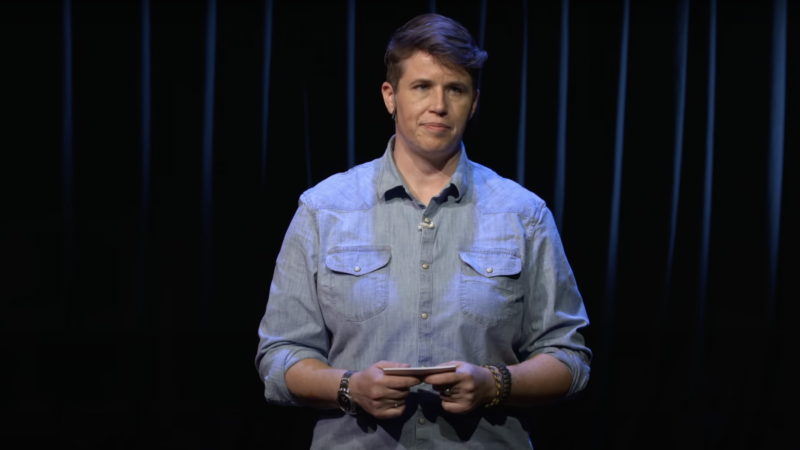
Lauren Hough is the author of Leaving Isn’t the Hardest Thing, a memoir and collection of essays about her life. Hough, who is gay, grew up in a Christian doomsday cult and later joined the military while “don’t ask, don’t tell” was still in effect.
The Lambda Literary Foundation, an organization for LGBTQ writers and readers, recently informed Hough that her book was a finalist for a “Lammy” Award. She was thrilled.
“The Lambda Prize exists because when someone like me, which is to say, a queer person, manages to publish a book with queer themes, those books are often ignored by mainstream prize committees,” she wrote on Substack. “Prizes get media attention. Prizes create name recognition and bring in new readers. Prizes sell books. Prizes like the Lambda also come with a check.”
Alas, it was not to be. Lambda informed Hough that it had decided to withdraw her nomination due to “the Twitter disputes last week.”
“So sorry to pass this news along,” wrote a representative for Lambda in an email to Hough.
The Twitter disputes, according to Hough, refer to her defense of Sandra Newman, a young adult (YA) fiction novelist whose new book, The Men, concerns a dystopia where everyone with a Y chromosome vanishes from the earth. Newman had the audacity to describe her book as follows: “The book is about women who can’t let go of the men they’ve lost, and devote their lives to getting them back.”
This premise ran afoul of certain transgender Twitter activists, since “everyone with a Y chromosome” is a category that includes not just men but also transgender women, and the people left behind would be not just women but also transgender men. Indeed, one such activist described Newman’s plotting as “transphobia and transmisogyny.”
The world of YA fiction includes a small contingent of extremely woke, social justice–conscious early reviewers with tremendous power to sic the mob on books and authors who offend them for very slight reasons. It’s a disturbing phenomenon—documented by Jesse Singal in the pages of Reason, and by Kat Rosenfield elsewhere—and as pure an example of cancel culture as one can find.
Hough defended Newman, and for that, she is no longer up for a Lammy:
When YA twitter came for Sandra, someone who has always been there for me, I responded. I told them to read the book before condemning it. I told them characters and plot don’t necessarily reflect the politics and views of the author. I told them to read the fucking book, or don’t.
I’d read the book. Sandra Newman sent it to me in an early form and I gave her a few notes, like we do for one another. I’m not transgender and neither is Sandra (Sandra is nonbinary), but we discussed how to make the book recognize the reality of transgender people. Other books that started from this premise—all the men disappear—have erased the existence of trans people, and it was important to her not to do that, to be as sensitive as possible. So when I saw people assuming that simple idea was the entirety of the plot, I told them to read the book before assuming the worst. For this, I was labeled a TERF.
I’m not a fucking TERF. No reasonable person could think I’m a TERF. It’s actually quite easy to find out whether or not I’m a TERF. All you have to do is ask me, or spend two minutes scrolling my twitter timeline. Sandra Newman isn’t a TERF either, something that can be easily discovered by the same methods.
A TERF, or “trans-exclusionary radical feminist,” is generally defined as a feminist who denies that transwomen—who began their lives as biological males—are women. Neither Hough nor Newman describe themselves as holding that view; nor does it appear that either of their books promote that view. But a small number of people who purport to speak for the transgender community end up implicitly making the claim that even acknowledging differences—like the presence of a Y chromosome—between women and transwomen is a form of bigotry.
Lambda Literary exists to celebrate queer authors for telling stories about queer people—for helping to destigmatize the LGBTQ community. The irony is that in this case, the organization is participating in the social shaming of a queer author who evoked the anger not of social conservatives but of far-left activists. Sadly, this is not the first time that Lambda Literary has succumbed to such pressure. The organization did not respond to a request for comment.
“I am a queer woman, and I was silenced most of my life,” wrote Hough. “I found my voice, but if my nomination is being withdrawn for using it, what the fuck is the point of Lambda Literary?”
The post Lambda Literary Awards Reject LGBTQ Author After She Defended a Friend Accused of Transphobia appeared first on Reason.com.
from Latest https://ift.tt/XxI1m7j
via IFTTT